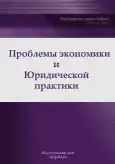«Акцессорность» как категория в теории права
- Авторы: Трухан Р.П.1
-
Учреждения:
- Белгородский государственный национальный исследовательский университет
- Выпуск: Том 19, № 3 (2023)
- Страницы: 19-22
- Раздел: Теоретико-исторические правовые науки
- URL: https://journals.eco-vector.com/2541-8025/article/view/568315
- EDN: https://elibrary.ru/USMDPM
- ID: 568315
Цитировать
Полный текст
Аннотация
В статье исследуются общетеоретические аспекты становления акцессорности в частном и публичном праве. Выделяются признаки акцессорности в отраслях права, сформулировано общетеоретическое понятие «Акцессорности». Указанная статья будет полезной для дополнения теоретического материала в познании акцессорности, например, преподавания института акцессорных обязательств в магистратуре. Поскольку данный институт, по справедливому мнению Е.Н. Феценко: «…нельзя признать достаточно разработанным, поскольку в отечественном праве исследованию подвергались, в основном, поименованные обеспечительные обязательства.» [Феценко ЕН., 2013], а потому следует признать, что для полного понимания теории «Акцессорности» необходимо его комплексное изучение, не только на уровне перевода термина с латинского и рассуждений в узкоотрослевом гражданском направлении, но и понимании акцессорности исходя из его исторического развития и особенностей её рецепции в российском праве. Исходя из исследования указанных постулатов, можно было бы определить его общетеоретическое понятие. Большинство исследовательских работ затрагивающих акцессорность, имеют узкоотраслевой (частноправовой либо уголовно-правовой) подход, при том, что отсутствуют исследования обосновывающие, что акцессорность—это правовой институт. А может—это юридическое понятие или юридическая конструкция. Судебная практика пошла еще дальше: суды активно ссылаются на акцессорную природу обязательства, прежде всего обеспечительных, в то время как свойство акцессорности не закреплено и не раскрыто [Евсеева Л.А., Трухан Р.П., 2020]. Выходит, что свойство акцессорности применяется, интуитивно, лишь по косвенным признакам акцессорности (дополнительный (зависимый акцессорный) характер по отношению к обеспечиваемому) [2, 3], что не допустимо, поскольку применяемая терминология при отправлении правосудия, должна быть выверена с точки зрения её формально-юридической определенности [Евсеева Л.А., Трухан Р.П., 2020]. Отсюда можно предположить, что акцессорность применяется в качестве правового инструмента. Поэтому правильное понимание акцессорности как правовой категории особенно важно.
Ключевые слова
Полный текст
Об авторах
Роман Петрович Трухан
Белгородский государственный национальный исследовательский университет
Автор, ответственный за переписку.
Email: trukhan.roma@bk.ru
соискатель ученой степени кандидата юридических наук
Россия, БелгородСписок литературы
- Венская Конвенция о праве международных договоров (Заключена в Вене 23.05.1969) // Ведомости ВС СССР. 1986. № 37. Ст. 772.
- Постановление Седьмого арбитражного апелляционного суда от 17.11.2015 № 07АП-11268/2015 по делу № А45-17966/2015 // СПС Консультант Плюс».
- Постановление Девятнадцатого арбитражного апелляционного суда от 23.03.2012 № А36-1559/2011 // СПС Консультант Плюс».
- Буркова А.Ю. Акцессорные обязательства // Вестник арбитражной практики. 2012. N 2. С. 39–45.
- Гонгало Б.М. Учение об обеспечении обязательств. М.: Статут, 2002. С. 34.
- Евсеева Л.А., Трухан Р.П. О совершенствовании законодательства Российской Федерации, регулирующего акцессорные обязательства. Северо-Кавказский юридический вестник. 2020. № 1. С. 119.
- Зыков С.В. Родительские права на определение места жительства ребенка и порядка общения с ним: проблемы теории и практики журнал «Актуальные проблемы российского права», № 3, март 2022 г. // СПС «Консультант Плюс».
- Кулаков Андрей Владимирович, Болотина Александра Юрьевна. Понятие и проблемы правовой природы соучастия в преступлении // Вестник Самарского юридического института. 2021. №5 (46). URL: https://cyberleninka.ru/article/n/ponyatie-i-problemy-pravovoy-prirody-souchastiya-v-prestuplenii (Дата обращения: 03.05.2023 г.).
- Международное частное право: иностранное законодательство / А.Н. Жильцов, А.И. Муранов. М.: Статут, 2001, 892 с.
- Надточий И.О., Трухан Р.П. Возникновение категории «акцессорность» и исторические особенности её рецепции в российском гражданском праве // Юридические исследования. 2021. № 5. doi: 10.25136/24097136.2021.5.35572 URL: https://nbpublish.com/library_read_article.php?id=35572 (Дата обращения: 02.05.2023 г.).
- Пушкин А. Принципы акцессорной и самостоятельной ответственности соучастников преступлений // Законность. 2001. № 3. С. 27–30.
- Римское и современное уголовное право / Бойко А.И.»: Юридический центр Пресс; Санкт-Петербург; 2003. С. 86.
- Трухан Р.П., Надточий С.О. К вопросу о дополнительных («Квазиакцессорных») обязательствах в международном праве // Право и государство: Теория и практика. 2022. № 7. С. 50–53.
- Торкин Д.А. Недостатки свойства акцессорности обеспечения обязательств // Юрист. 2005. № 7. С. 43.
- Феценко Е.Н. Методика и особенности преподавания в магистратуре института акцессорных обязательств // Образование и право. 2013. № 5 (45). С. 55–65.
- Фролов А.И. Акцессорность как эффект функциональной производности гражданского правоотношения // Вестник Томского государственного университета. Право. 2018. № 29 С. 193 doi: 10.17223/22253513/29/18(Дата обращения: 02.05.2023 г.).
Дополнительные файлы









